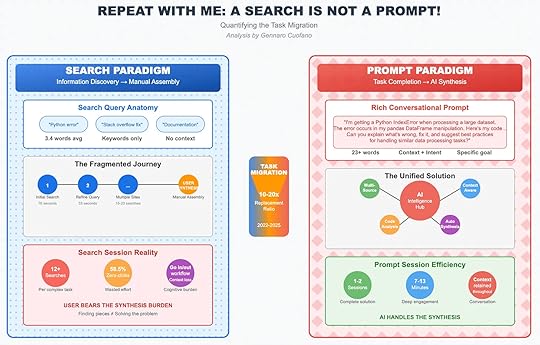A Google Search Is Not a ChatGPT Prompt

For decades, the search box has been the gateway to the web. Users typed short, contextless queries — “Python error,” “Stack overflow fix,” “Documentation” — and then stitched together answers across multiple tabs. This ritual defined digital work.
But in the AI era, that ritual collapses. A search is not a prompt. And the migration from search-driven discovery to prompt-driven synthesis is transforming not just how we interact with information, but how value is created online.
The Search Paradigm: Fragmentation and BurdenSearch queries are shallow by design. The average Google query contains 3–4 words, stripped of nuance, intent, or context.
The journey looks like this:
Initial Search → A keyword-based query, returning partial results (avg. 76 seconds).Refined Queries → Users rephrase, iterate, and add modifiers (avg. 53 seconds).Fragmented Sources → 15–20 different searches across multiple sites.Manual Synthesis → Users themselves must reconcile contradictions, verify accuracy, and assemble solutions.This creates what I call the synthesis burden. Users do not receive answers; they cobble them together.
The inefficiency is measurable:
12+ searches per complex task.58.5% zero-click rate, where no result provides usable value.Context switching across tabs, breaking workflow and attention.The user carries all the cognitive load.
The Prompt Paradigm: Task Completion, Not DiscoveryAI flips this model. Instead of issuing fragmented queries, users provide rich conversational prompts:
“I’m getting a Python IndexError when processing a large dataset. The error occurs in my pandas DataFrame manipulation. Here’s my code… Can you explain what’s wrong, fix it, and suggest best practices for handling similar tasks?”
This is not a search. It’s a direct expression of intent, context, and goal.
From that single input, the AI intelligence hub engages:
Multi-Source Processing — pulling from documentation, examples, and prior knowledge.Context Awareness — retaining conversation flow and prior clarifications.Auto-Synthesis — merging fragments into a coherent, actionable solution.Code Analysis — in technical use cases, testing and fixing errors directly.The user receives not a list of links but a unified solution.
Task Migration: Quantifying the ShiftThe migration from search to prompts is not linear — it’s multiplicative.
One prompt can replace 10–20 searches. Instead of bouncing across Stack Overflow, Reddit, and documentation, the user compresses the journey into a single conversational session.
Metrics illustrate the efficiency:
1–2 sessions deliver complete solutions.7–13 minutes of focused interaction replaces 20+ minutes of scattered searching.Context retention ensures continuity across interactions.The key difference: AI handles the synthesis. Users no longer assemble fragments; they receive finished answers.
Why a Search ≠ a PromptIt’s tempting to conflate search queries with AI prompts. After all, both involve typing into a box. But the mechanics — and the economics — are fundamentally different.
Search = Discovery. Users hunt for fragments, validate them, and assemble outcomes.Prompt = Completion. Users express intent; AI delivers integrated outcomes.This changes everything:
For users, cognitive load collapses.For businesses, discoverability strategies must shift from ranking in SERPs to being citable in AI synthesis.For platforms, the revenue model shifts from click arbitrage to task monetization.The Synthesis DividendThis migration creates a productivity dividend. By offloading synthesis to AI, humans reclaim both time and attention.
Developers resolve bugs faster.Analysts synthesize reports in fewer steps.Consumers make purchase decisions in seconds, not days.The old bottleneck was information access. The new bottleneck is quality of synthesis.
Strategic ImplicationsFor UsersWorkflows accelerate. Complex tasks compress into conversational loops. The skill shifts from finding information to framing prompts.
For BusinessesThe SEO arms race loses relevance. The new game is AI readiness — ensuring your brand, product, or expertise is present in the data streams AI draws from. Structured content, citations, and partnerships with AI platforms become essential.
For PlatformsGoogle, Amazon, and others face a disruptive truth: queries are shrinking while prompts are expanding. Ad revenue built on keyword targeting erodes. The monetization of the future will flow through AI-driven task layers — subscription, verification, and transaction fees.
A Search Is Not a PromptThis shift demands a mental reset. Typing “Python error” and typing a 23-word conversational request may feel similar. But they belong to different paradigms.
Search is about finding.Prompts are about solving.Once you see this difference, the scale of task migration becomes obvious. The companies that treat prompts as an evolution of search will miss the point. The companies that design for task completion will own the future.
Final WordThe web era was built on search boxes. The AI era will be built on prompts.
Search was fragmented, shallow, and burdened the user with synthesis. Prompts are contextual, conversational, and outsource synthesis to AI.
This is not a UX tweak. It’s a paradigm inversion.
A search is not a prompt. And recognizing that distinction is the first step to understanding where digital value — and competitive advantage — is migrating.

The post A Google Search Is Not a ChatGPT Prompt appeared first on FourWeekMBA.



